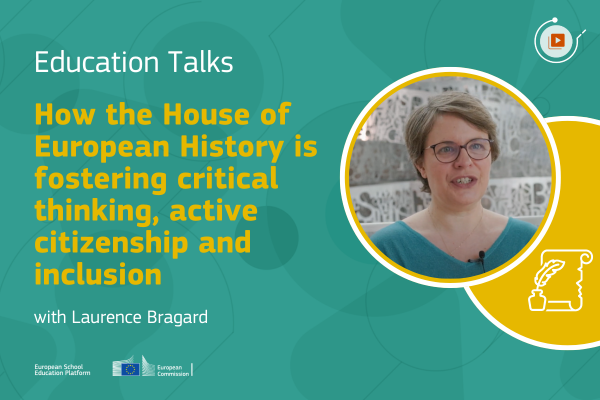Education Talks - The House of European History fostering critical thinking and active citizenship

How the House of European History is fostering critical thinking, active citizenship and inclusion
Αt the House of European History we have a European scope. We address our learning resources not only to the teachers from Brussels but from all around Europe. Τhe mission is to address European history and European integration with multi-perspectivity.
Ηow do we know what the needs and expectations are from teachers across Europe? Βecause this is a very large scope. So, what we did recently is to interview and do an evaluation with a thousand teachers from across Europe and we learned that a large majority of teachers are using learning resources from museums to add this in their learning practice and in their teaching practice. They identify museums as a place of trust, they find these resources reliable and they find that it allows to multiply the perspectivity and also to encourage critical thinking.
I would also like to bring into this the new museum definition where it is said that the museum is accessible and inclusive, and it fosters diversity and sustainability. With this definition in mind, we developed our learning resources for teachers at the House of European History.
We are very lucky. Almost 30% of our audience is made of school students and we based our reflection on a system that we call 'the three Rs': Remember, Reflect and Respond.
- Remember is the role of memory, it's the role of the knowledge acquisition that you have in all programs.
- Reflect is about critical thinking, it's about inquiry-based learning, asking questions, it's about creating links between today's world and the past and the curiosity for the past to understand today's world better.
- Respond is to create this active citizenship.
We recently launched a new workshop called 'the EU Pioneers' where students are discovering the life of those EU pioneers that created an EU when the idea didn't even exist after the Second World War.
We also do this with online programmes, and we are currently developing a digital toolbox that will be available in 24 languages and we always use this visible thinking method or other methodologies because it helps us to identify the questions and the concerns that students have and then the facilitator can create the content based on this.
It also helps to develop observation. We are in a museum, it's object-based. It's important that first students observe the object that they have in front of them and that they notice things.
It's important that we have videos so the ones that prefer to learn by moving images can do this, the ones that prefer to have all the information about the facts can also have this at different points, either in the on-site activity but also in the online toolbox that we're currently developing.
It's a mission from the House of European History to be inclusive. How do you do that? You can do this by developing content that includes different perspectives which is again our mission. But you can also do it by including different voices, including the voices of minorities.
You can also do this by the methodology you use to create a safe space where students can say what they think without judgement, where all answers are welcomed whether it is a funny answer or a provoking answer. All of these voices need to have a safe space to be vocalised.
To include different voices we also include women in the digital toolbox, in the EU leaders. It's not only the men who signed the treaties. We also developed a module on Simone Veil and Louis Weiss to show their role and to include their voice in the general context of these EU leaders.
Civic engagement is also facilitated by the fact that the House of European History is for free. You don't pay the entrance, you don't pay for the workshops, you don't pay for the guided tours and neither for the events, so stay tuned and come and visit us.
Additional information
-
Education type:School Education
-
Target audience:TeacherStudent TeacherHead Teacher / PrincipalPedagogical AdviserTeacher EducatorGovernment staff / policy makerResearcher
-
Target audience ISCED:Primary education (ISCED 1)Lower secondary education (ISCED 2)Upper secondary education (ISCED 3)
